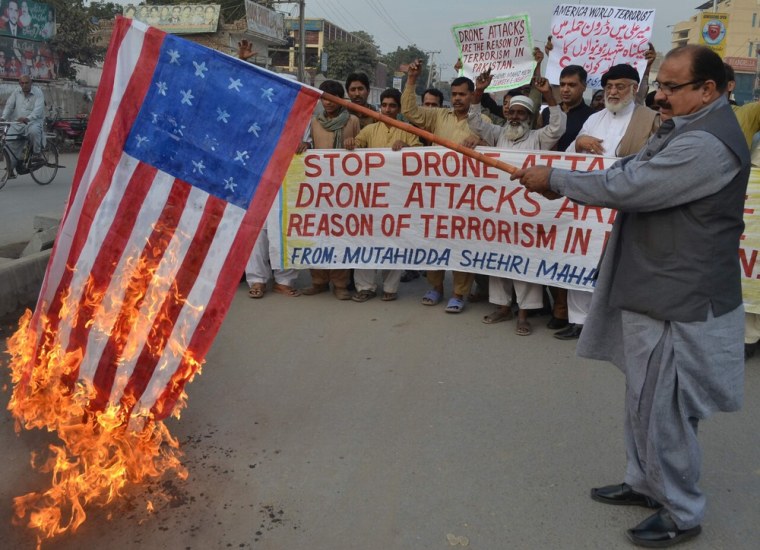Targeted killing is back on page A1, at least temporarily. On Monday, NBC's Michael Isikoff reported on a leaked Justice Department white paper which defends the legality of killing American citizens extrajudicially.
Questions about that memo will no doubt arise at the impending Senate confirmation hearings for John Brennan, the White House "assassination czar" who President Obama recently nominated to head the CIA. After the election and all the manufactured fiscal cliff hysteria, the American public has a brief, rare opportunity to litigate the Obama administration's expansive targeted killing program.
If this opportunity goes to waste, it might be a result of the skewed language we use to talk about targeted killings. Too often, second-order concerns muddle the issue: Most notably, the legality of killing American citizens and the unique properties of remotely piloted drones. The Isikoff story, for example, made such a huge splash precisely because it directly concerns American citizens—and most subsequent reporting and commentary has used "drones" as a shorthand for "targeted killing."
In fact, drones are not the only tool available for carrying out extrajudicial killings—for example, the al-Majalah strike in Yemen (which Amnesty International claims killed 41 civilians, including 21 children) was conducted with Tomahawk cruise missiles and cluster bombs, not drones. And as Adam Serwer writes in Mother Jones, the DoJ white paper's legal justifications apply to any method of targeted killing, meaning that "government officials could theoretically send assassins to hunt down suspected terrorists."
That is not to say that the drone's capacity for remote targeting does not lead us into unexplored ethical territory. Philosopher Bradley Strawser has argued that drones "can be a morally preferable weapon of war," while John Kaag and Sarah Kreps reply that their use leads to moral hazard. However, the unique morality of immorality of drone warfare does not shed much light on the morality or immorality of targeted killing policy as a whole.
Similarly, an argument about the ethics of killing American citizens can only be viewed as a distraction. The vast majority of those killed by extrajudicial government policies are Pakistani or Yemeni, not American. The disproportionate attention paid to American deaths makes sense only if killing Americans is particularly immoral or illegal.
I'm not qualified to adjudicate the legal argument—in fact, nobody may be, given how much of the rationale for targeted killing remains shrouded in secrecy. But even if specifically targeting American citizens without due process is legal, it does not follow that it is justifiable. If anything, it may only justify a Congressional push to change the law around targeted killings.
Nor is there any good argument for denouncing the killing of Americans as more immoral than the killing of Pakistanis and Yemenis—not unless you want to make the obviously abhorrent argument that the life of an American is simply worth more. Otherwise, one could argue that killing Americans violates a contract they have with the state guaranteeing them certain rights and protections. The problem is that such contracts are spelled out in the law, meaning that this line of reasoning begs the question and forces us to once again debate legal matters.
These interminable battles function as a smokescreen for the troubling reality of the targeted killing policy—and the War on Terror—as a whole. If Abdulrahman Al-Awlaki were a 16-year-old Pakistani boy who had been killed by an American assassination squad, as opposed to a 16-year-old American killed by an American predator drone, we would still have to reckon with our government's culpability in his death.
What makes the targeted killing program so repellent is not the technology being used or the nationality of the dead; it is the fact that the American executive branch is signing death warrants with impunity, based on an opaque bureaucratic procedure which has little to do with anything we'd recognize as due process. Hundred, perhaps thousands, of non-combatants have now lost their lives in the name of the "War on Terror": an ideological construct which now exists solely to grant the American government sweeping war powers on a permanent basis, so that it might fight a diffuse and ever-variable enemy.
